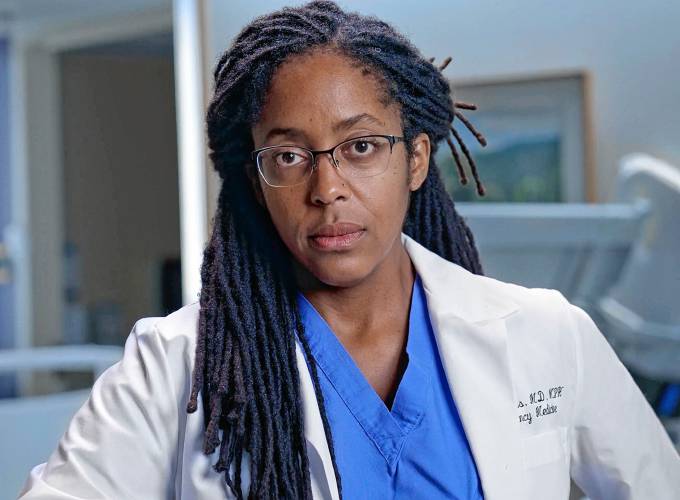Columnist Tolley M. Jones: Faces of Medicine

Dr. Khama Ennis, former president of the medical staff at Cooley Dickinson Hospital, has created a documentary series on the impact Black women physicians have on Black Americans’ health and the barriers those women face. CONTRIBUTED/FACES OF MEDICINE
|
Published: 03-13-2024 4:40 PM
Modified: 03-13-2024 9:39 PM |
“If you think we live in the land of the free, you should try to be black like me.” — Mickey Guyton
Have you ever been told as a child you can’t possibly be as smart as you are? Have you ever been accused of cheating because your test scores were higher than everyone else’s and teachers believed you could never be smarter than white students?
Were you put in classes with low expectations, denied access to rigorous curriculum, and did you have your academic achievements resentfully ignored? Were you actively discouraged from going to college or from reaching for challenging schools, degrees, and careers?
If you managed to push against all of that and get to where you wanted, have you constantly had your credentials questioned as you try to do your job? Do people ask you where you went to school? Do they ask you where you are from, in a way that lets you know they aren’t asking because they are wondering if it was a cool place to grow up? Do they question your intelligence, your training, your expertise, and your right to even have any of those things, because you don’t “look like a doctor?”
For Black female physicians in the United States, the answer to all of those questions is overwhelmingly “yes.” The odds are stacked against Black girls who want to become doctors right from the beginning. One third of 1% of the U.S. population are physicians. Only 2.8% of that very small number are Black women.
Research proves that this disparity is not just an uncomfortable remnant of racism, something people perhaps shake their head at while shruggingly accepting it as a vague and intangible problem of numbers and resource distribution. In actuality, the lack of Black physicians in America is a life-and-death crisis. The U.S. has the highest infant mortality rate among all other high-income countries in the world, but for Black infants, that mortality rate is more than twice that of white infants.
However, when Black infants have a Black pediatrician, that disparity in the mortality rate drops by more than 50%!
Dr. Khama Ennis, MD, MPH, former president of the medical staff at Cooley Dickinson Hospital in Northampton, former chief of emergency medicine and medical director for the Emergency Department at Cooley Dickinson Hospital, is well acquainted with the enormous disparities in health care outcomes for Black patients in the United States, and she is working to illuminate the serious impact the lack of Black physicians has on overall health for Black Americans.
Article continues after...
Yesterday's Most Read Articles
In particular, she is highlighting the deep systemic challenges faced by Black girls as they grow up and reach for essential careers as physicians. She is the creative visionary and founder of “Faces of Medicine,” a documentary series centered on the paths of Black female physicians in the United States (www.facesofmedicine.org/).
As I watched “Faces of Medicine,” I was moved to tears of fury hearing Black female doctor after doctor tell their story about how they were brilliant right out of the gate as young children, yet they can recall with perfect clarify the impotent humiliation and anger they felt when white teachers in positions of authority and gatekeepers of the path to future steps toward adult goals, actively discouraged them from even reaching for success. By refusing to even believe that Black girls are smart, driven, capable, and essential to public health as physicians, educators perpetuate a multilevel, multifaceted calculated suppression designed to keep Black Americans in the roles white America has decreed are appropriate.
Even after a Black woman has fought upriver against the stiff current of hostile resistance, extricated herself from the invisible constricting web of cloyingly low expectations, and wrested her rightfully earned medical degree from the alabaster grip of systemic racism, she faces a lonely and frustrating path. As the only Black female physician (and often the only Black person on the medical staff), she is tasked with diversifying these white spaces as extra free emotional labor, while dealing with daily casual and overt racism that allows people to openly challenge her qualifications and capacity.
“They have no idea the cumulative impact of these conversations. For them it was one conversation. For me it was the third slight that day … If it is uncomfortable to know that someone is slowly being poisoned, imagine how it feels to drink sips of poison every single day,” says Dr. Ennis. Her documentary allows Black female physicians to describe in their own words the consequences of a constant daily diet of that poison from childhood through adulthood. It also prescribes the actions necessary to combat the toxic and fatal results of lack of Black female representation in medicine.
Health outcomes for everyone improve when you improve the outcomes for the most vulnerable, and research proves that supporting Black girls as they reach for careers as physicians is critical for dismantling the impact of systemic racism on Black health care in America. And as each Black female physician “reaches back and pulls forward” (Dr. Thea James) the next generation of Black girls striving for careers in medicine that match their intelligence and determination, Black female physicians will become an ubiquitous part of the medical landscape of America, to everyone’s benefit.
To donate to the production of future episodes of “Faces of Medicine,” and to find the schedule for future screenings, go to fundraising.fracturedatlas.org/faces-of-medicine.
Tolley M. Jones lives in Easthampton. She writes a monthly column.

 Guest column: Serving educational needs shouldn’t be ‘aspirational’
Guest column: Serving educational needs shouldn’t be ‘aspirational’ My Turn: Gaza and lies
My Turn: Gaza and lies Guest columnist Mariel E. Addis: Pride and prejudice
Guest columnist Mariel E. Addis: Pride and prejudice Guest columnist Gene Stamell: We know what we know
Guest columnist Gene Stamell: We know what we know
